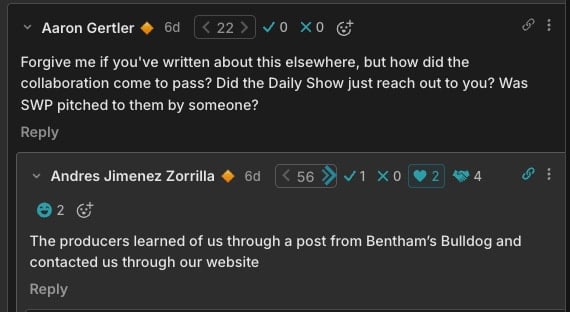David Rubinstein recently interviewed Philippe Laffont, the founder of Coatue (probably worth $5-10b). When asked about his philanthropic activities, Laffont basically said he’s been too busy to think about it, but wanted to do something someday. I admit I was shocked. Laffont is a savant technology investor and entrepreneur (including in AI companies) and it sounded like he literally hadn’t put much thought into what to do with his fortune.
Are there concerted efforts in the EA community to get these people on board? Like, is there a google doc with a six degrees of separation plan to get dinner with Laffont? The guy went to MIT and invests in AI companies. In just wouldn’t be hard to get in touch. It seems like increasing the probability he aims some of his fortune at effective charities would justify a significant effort here. And I imagine there are dozens or hundreds of people like this. Am I missing some obvious reason this isn’t worth pursuing or likely to fail? Have people tried? I’m a bit of an outsider here so I’d love to hear people’s thoughts on what I’m sure seems like a pretty naive take!
I've been thinking about this issue recently too. I think it's pretty clear in the case of Warren Buffet and other ultra-wealthy.
Generally, I think EAs sort of live and breath this stuff, and billionaires/major donors are typically in a completely different world, and they generally barely care about it.
I've been asking around about efforts to get more rich donors. I think Longview is often heralded as the biggest bet now, though of course it's limited in size. My guess is that there should be much more work done here - though at the same time - I think that this sort of work is quite difficult, thankless, risky (very likely to deliver no results), is often a big culture clash, etc.
Like, we need to allocate promising people to spend huge amounts of time with a lot of mostly-apathetic and highly selfish (vs. what we are used to around EA) people, with a high likelihood of seeing no results after 5-30 years.
I think this is in the vein of what Jack Lewars is doing?
Could be!
I assume the space is big enough, it could another absorb 20-60 people plus.
I've also heard of some other high network projects coming from Charity Entrepreneurship, but I haven't investigated.
Thanks for pointing this out :)
I think longview philanthropy might look after HNW individuals in the EA space?



David Rubinstein recently interviewed Philippe Laffont, the founder of Coatue (probably worth $5-10b). When asked about his philanthropic activities, Laffont basically said he’s been too busy to think about it, but wanted to do something someday. I admit I was shocked. Laffont is a savant technology investor and entrepreneur (including in AI companies) and it sounded like he literally hadn’t put much thought into what to do with his fortune.
Are there concerted efforts in the EA community to get these people on board? Like, is there a google doc with a six degrees of separation plan to get dinner with Laffont? The guy went to MIT and invests in AI companies. In just wouldn’t be hard to get in touch. It seems like increasing the probability he aims some of his fortune at effective charities would justify a significant effort here. And I imagine there are dozens or hundreds of people like this. Am I missing some obvious reason this isn’t worth pursuing or likely to fail? Have people tried? I’m a bit of an outsider here so I’d love to hear people’s thoughts on what I’m sure seems like a pretty naive take!
https://youtu.be/_nuSOMooReY?si=6582NoLPtSYRwdMe
Could be!
I assume the space is big enough, it could another absorb 20-60 people plus.
I've also heard of some other high network projects coming from Charity Entrepreneurship, but I haven't investigated.